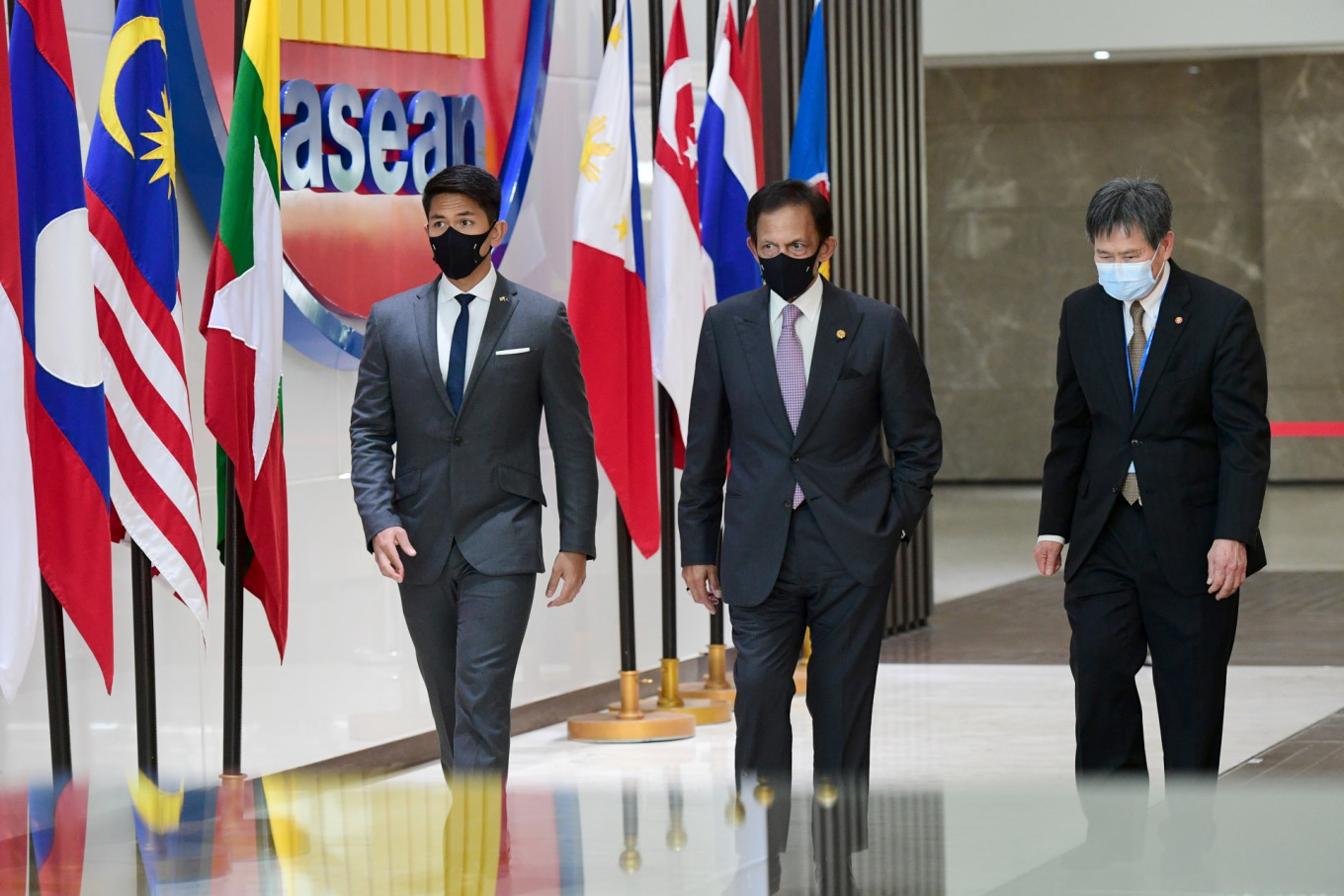Popular Reads
Top Results
Can't find what you're looking for?
View all search resultsPopular Reads
Top Results
Can't find what you're looking for?
View all search resultsSE Asians view ASEAN as ‘slow and ineffective’
Survey finds China more influential but Japan more reliable.
Change text size
Gift Premium Articles
to Anyone
S
outheast Asians are increasingly concerned that ASEAN is too “slow and ineffective” in responding to political and economic developments, a new survey has found, just as the region’s top diplomats convene over the Myanmar coup fallout and amid growing rivalry in the Indo-Pacific.
This year’s State of Southeast Asia study, conducted between November and December last year by the Singapore-based ISEAS-Yusof Ishak Institute, takes the pulse of a region shaken by the COVID-19 pandemic and rising geopolitical tensions.
The growing frustration that has ensued is becoming more palpable among the survey’s 1,677 respondents, for whom a “people-centered ASEAN” rings largely hollow.
An overwhelming majority of respondents (70.1 percent) were most concerned about ASEAN’s inability to “cope with fluid political and economic developments”, overtaking last year’s top concern that the region was becoming “an arena of major power competition” and that ASEAN member states may become proxies to those forces.
Last year, the concern that ASEAN was becoming a geopolitical theater for major powers (70.8 percent) was greater than ASEAN’s own shortcomings (69.5 percent).
A further 49 percent of respondents this year believed that ASEAN was unable to overcome current pandemic challenges – the third biggest concern of the people – slightly lower than the results of the 2021 ISEAS survey (51.4 percent).
The regional grouping appeared to be more divided than before, which poses a significant challenge for ASEAN centrality. Member states are taking different positions within ASEAN depending on the issue, said Thitinan Pongsudhirak, director of the Institute of Security and International Studies at Chulalongkorn University.
“Myanmar has become the new front and center issue for ASEAN. It’s sucking the oxygen from the [other] regional discussions, debates and discourses,” he said at the virtual launch of the survey on Wednesday.
Since the putsch last year, ASEAN has been sluggish in its response to the crisis, even after the region’s leaders put together demands for coupmaker Min Aung Hlaing, which includes the swift delivery of humanitarian assistance and the facilitation of inclusive dialogue by ASEAN mediation.
But the bloc’s Five-Point Consensus (5PC) was met only by an uncooperative junta, which has killed more than 1,500 civilians and arbitrarily detained thousands more.
ASEAN has since sought to bar members of the military regime from joining regional meetings – sometimes at the expense of dialogue. Without any means to send troops or impose sanctions, the association can only rely on its diplomatic tools for a breakthrough.
Meanwhile, ordinary people from the region are getting impatient. This year, respondents are split almost equally in their view of the steps ASEAN had taken to mitigate the excesses of the Feb. 1, 2021 coup d’etat.
The survey found that a slight majority of people (37 percent) approved of ASEAN’s response to the crisis in Myanmar, where military forces usurped power from a democratically elected government, sparking prolonged chaos and growing opposition across the country.
A further 33.1 percent said they disapproved of the regional response, while 29.9 percent stayed neutral.
Read also: Indonesia looks to steer ASEAN out of Myanmar coup fallout
United we stand
While ASEAN could certainly have acted much faster on the humanitarian aspects of the Myanmar coup response, there were institutional and structural reasons why the bloc was unable to move as fast as it should, said Chan Heng Chee, the Singapore government’s ambassador-at-large.
“Our constitution does not allow us to suspend and expel a member state. Of course, there’s nothing to stop ASEAN rethinking and introducing this, but we are not there,” she said on Wednesday, in reference to the association’s cumbersome consensus-based decision-making process.
However, Chan also suggested that when united, ASEAN was capable of pushing back against major powers, including against China over the issue of the South China Sea.
Amid overlapping territorial claims in the strategic waters between Beijing and several member states, ASEAN is negotiating a binding Code of Conduct in the South China Sea, a Chinese responsibility that is 20 years overdue.
Chan also said that if ASEAN came together and spoke as one voice, it could influence the Quad – an informal group bringing together the United States, Japan, India and Australia – from only focusing on containing China, to placing more emphasis on regional prosperity.
“If ASEAN sticks together, you can have some influence so ASEAN is not irrelevant, and you can still do something about ASEAN centrality,” she said.
Read also: Southeast Asians worried by superpower rivalry: Survey
People’s choice
More than 76 percent of respondents viewed China as the most influential economic and political force, but such growing influence was met with concerns over Beijing’s policies in the South China Sea and the Mekong Delta.
Of the 58.1 percent of respondents who expressed distrust toward China, 49.6 percent of them feared that China could use its economic and military power to threaten their country’s interests and sovereignty.
In contrast, Japan was found to be the most trusted major power among Southeast Asians, with 54.2 percent of respondents confident it would “do the right thing”.
Meanwhile, the US, now led by President Joe Biden, overtook the European Union in this year’s survey as the people’s top choice for global leadership.
About 36.6 percent of respondents chose the US as a country that would maintain the rules-based order and international law, over 10 percent more than last year when Biden had just entered office. The EU is now ranked third for global leadership (16.6 percent), just under the percentage of people who believe in ASEAN’s prowess (16.8 percent).










